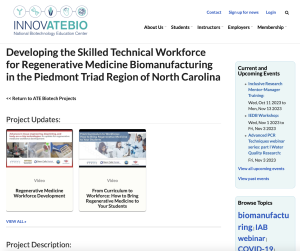Developing the Skilled Technical Workforce for Regenerative Medicine Biomanufacturing in the Piedmont Triad Region of North Carolina

A 2019 National Science Board report stressed the critical need for an exceptional skilled technical workforce to ensure the success of the nation's science- and engineering-driven industries. This project will serve the national interest by preparing skilled technical workers in regenerative medicine, an emerging field that aims to repair, regrow, or replace damaged cells, organs, and tissues. Regenerative medicine is a cross-disciplinary field of biotechnology and bioengineering that includes convergent technologies such as nanotechnology, artificial intelligence and machine learning, mechanical engineering technologies, data science, and cyberbiosecurity. Regenerative medicine is rapidly evolving from basic research and development stages, through clinical translation and into biomanufacturing. A significant gap in availability of skilled technicians in regenerative medicine biomanufacturing has been defined by identifying the required skills and the extent of the skills gap. To help fill this need, Wake Forest Institute for Regenerative Medicine is partnering with Forsyth Technical Community College, Simon G. Atkins High School, regional Historically Black Colleges and Universities, employers, and professional and trades organizations. This partnership intends to bring the new science and technology of regenerative medicine into the community college sector to ensure the nation prepares the needed regenerative medicine technicians.
The project intends to meet this goal by developing a regional model for education of skilled technicians in regenerative medicine biomanufacturing. Specifically, it will develop and deliver faculty professional development in regenerative medicine, from the high school level through community college and university levels (through articulated programs). It will also disseminate research-based knowledge, skills, and abilities for the regenerative medicine field to community colleges and their partners. Finally, the project will develop multiple career entry options and pathways for community college-prepared technicians and incumbent employees, with a focus on serving people from communities that are underrepresented in STEM. The project builds upon recent NSF-sponsored Advanced Technology Education efforts, which have provided the scientific, technical, and educational foundation for this project. The project team plans to work with diverse teams of experts enabling development and production of replacement cells and organs and the expansion of cells for therapy.
Comments